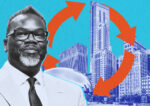The four office-to-residential conversions that Mayor Brandon Johnson greenlit in April, as part of an effort to revitalize the Loop, are moving forward.
The Chicago Community Development Commission, which oversees subsidies, has approved tax-increment financing to propel the $525 million worth of office-to-resi projects along the LaSalle Street corridor, Crain’s reported.
Chicago taxpayers are poised to allocate $151 million to developers, which include Chicago heavyweights like Mike Reschke’s Prime Group and Quintin Primo’s Capri Investment Group. The developers aim to transform office buildings — at 111 West Monroe Street, 208 South LaSalle Street, 30 North LaSalle and 79 West Monroe — into more than 1,000 apartments.
The commission’s nod allows the city to negotiate redevelopment agreements with each developer, although the projects still need approval from other city panels before going to City Council for final approval.
The initiative, launched by former Mayor Lori Lightfoot and continued by Johnson, aims to restore downtown foot traffic and incorporate affordable housing. Developers are required to allocate at least 30 percent of the units for residents earning an average of 60 percent of the area’s median income to qualify for the TIF subsidies.
A city report highlighted the urgency of the conversions, citing a 50 percent reduction in downtown workers post-pandemic, leading to a $3 billion annual decline in downtown spending. The decline in downtown office workers can be attributed to the remote-work era, which continues to drive up vacancies to historic highs.
To truly revitalize the area, city officials recognize the need for more grocery stores and retail spaces, which cater to residents rather than just office workers.
“Transitioning away from its monoculture of office uses into a mix of uses and neighborhood amenities that go beyond the typical 9-to-5 workday is what we envision for LaSalle Street tomorrow,” Planning and Development commissioner Cindy Roubik said.
The four projects will convert 1.3 million square feet of office space into 1,037 apartments, with 319 units designated as affordable. The conversions are projected to generate an additional $2.7 million in annual property tax revenue, marking a 37 percent increase.
Developers are contributing varying levels of equity to these projects, with Reschke’s team contributing 16 percent and 8 percent of costs for 111 West Monroe and 208 South LaSalle, respectively. In contrast, 30 North LaSalle and 79 West Monroe will see higher equity contributions of 19 percent and 44 percent percent; the developers behind those projects include a venture of Golub and Corebridge Financial, plus a venture of Campari Group and R2.
—Quinn Donoghue
Read more



